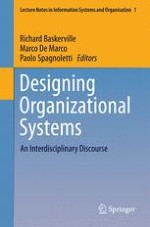2013 | OriginalPaper | Buchkapitel
Design Principles at the Edge of the Designable: Non-formal and Informal Learning in SMEs
verfasst von : Nunzio Casalino
Erschienen in: Designing Organizational Systems
Verlag: Springer Berlin Heidelberg
Aktivieren Sie unsere intelligente Suche, um passende Fachinhalte oder Patente zu finden.
Wählen Sie Textabschnitte aus um mit Künstlicher Intelligenz passenden Patente zu finden. powered by
Markieren Sie Textabschnitte, um KI-gestützt weitere passende Inhalte zu finden. powered by
